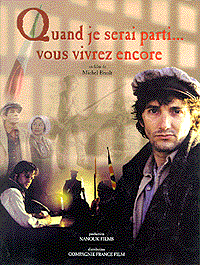| The Long Winter | |
|---|---|
 Theatrical release poster | |
| French | Quand je serai parti...vous vivrez encore |
| Directed by | Michel Brault [1] |
| Written by | Michel Brault |
| Produced by | Anouk Brault Claudio Luca [2] |
| Starring | Francis Reddy David Boutin Micheline Lanctôt Claude Gauthier |
| Cinematography | Sylvain Brault [3] |
| Edited by | Daniel Arié [3] |
| Music by | François Dompierre [3] |
Release date |
|
Running time | 126 minutes [4] |
| Country | Canada |
| Language | French |
The Long Winter (French : Quand je serai parti... vous vivrez encore) is a 1999 Quebec historical drama film. Directed by Michel Brault, it is a partly fictionalized account of the Lower Canada Rebellion of 1837 and 1838 which sought to make Lower Canada, now Quebec, a republic independent from the British Empire. [5]